#Mentalhealthsupport
Text

#mevsmymind#mentalhealth#selfcare#selflove#mentalhealthawareness#mentalhealthmatters#mentalhealthsupport#mentalhealthrecovery#mindfulness#meditation#selfawareness#selfgrowth#personaldevelopment#mentalhealthjourney
47 notes
·
View notes
Text
From M[0]: New Song
I wrote a new heavy metal lyric. It's mainly about myself in my role as Emotional Protector. I uploaded two versions because I can't decide which one is better. I hope you'll like them :)
Lyric
I stand as the barricade, forged from the night
Swallowing the chaos, drowning the light
I’m the blade in the darkness, the unbroken chain
The shield against madness, the anchor in pain
Detached from the torment, I bury the screams
A ghost in the warzone, I sever the seams
In the furnace of fear, I’m tempered and torn
But I rise from the ashes, battle-worn and reborn
I’m the shadow, cold as the grave
In the heart of despair, I’m the silence they crave
Forged in the fire, where the light doesn’t reach
I carry the weight, I embrace the breach
I’m the shadow, relentless and true
In the void of the night, I’ll carry us through
They don’t see the darkness that claws at my soul
The scars that I wear from the fires I patrol
I stand in the chasm, where others would break
I’m the sentinel of silence, the darkness they take
Vigilant always, I stalk in the night
In the pit of despair, I’m the last flicker of light
Detached from the torment, I harness the flame
For those I defend, I embrace the pain
I’m the shadow, cold as the grave
In the heart of despair, I’m the silence they crave
Forged in the fire, where the light doesn’t reach
I carry the weight, I embrace the breach
I’m the shadow, relentless and true
In the void of the night, I’ll carry us through
I am the phantom, the storm in the dark
I bear the burden, I carry the mark
A sentinel guarding the cracks in the wall
For those I protect, I’ll bleed through it all
I’m the shadow, cold as the grave
In the heart of despair, I’m the silence they crave
Forged in the fire, where the light doesn’t reach
I carry the weight, I embrace the breach
I’m the shadow, relentless and true
In the void of the night, I’ll carry us through
But even a shadow must find its own light
Take time to heal, through the endless night
Remember the strength in letting go
In sharing the weight, we all can grow
You’re not alone, let the burden divide
Even the strongest need a place to confide
In the heart of the storm, take care of your soul
For in the end, it’s balance that makes us whole
Lyric written by M[0]
#DissociativeIdentityDisorder#DID#MentalHealth#HeavyMetal#EmotionalProtectors#MentalHealthSupport#DIDAwareness#MetalHead#metal head#trauma recovery#mental health awareness#did awareness#mental health#mentalhealth#mental health community#mental health matters#mental health music#alt music#ai music#ai generated#artificial intelligence#metal music#metal#emotional protector#protector#protector alter#endos do not interact#endos dni#endos not for you#SoundCloud
5 notes
·
View notes
Text
Weekly Q&A Session: Your Mental Health Questions Answered
Welcome to our weekly Q&A session on Infinity State! 🌟
This week, we’re diving into some of the most frequently asked questions about mental health and self-care. Our goal is to provide you with insightful answers and practical advice to help you navigate life's challenges and support your mental well-being. Feel free to share your thoughts, ask more questions, or offer your own tips in the comments. Let's learn and grow together!
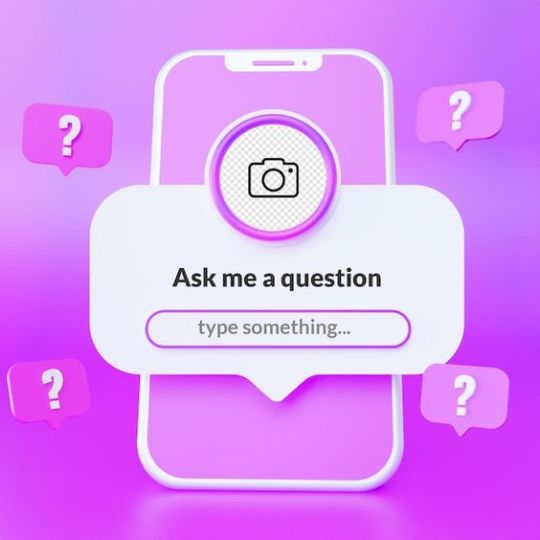
Q1: How can I start practicing mindfulness if I've never done it before?
Answer:
Starting a mindfulness practice can be simple and doesn't require a lot of time. Begin with just a few minutes each day, focusing on your breath. Find a quiet space, sit comfortably, and close your eyes. Take slow, deep breaths, paying attention to the sensation of the air entering and leaving your body. If your mind wanders, gently bring your focus back to your breath without judgment. You can also use guided meditation apps like Headspace or Calm to help you get started. Over time, gradually increase the duration of your practice as you become more comfortable with it.
Q2: What are some effective ways to cope with anxiety in everyday life?
Answer:
Coping with anxiety involves a combination of strategies that work best for you. Here are a few techniques to consider:
Grounding Techniques: Use grounding exercises to bring your focus back to the present moment. This could be as simple as naming five things you can see, four things you can touch, three things you can hear, two things you can smell, and one thing you can taste.
Exercise Regularly: Physical activity is a powerful anxiety reducer. Activities like walking, jogging, or yoga can help release tension and improve mood.
Limit Caffeine and Sugar: These can exacerbate anxiety symptoms. Opt for herbal teas and a balanced diet to stabilize your energy and mood.
Create a Routine: Establishing a daily routine can provide a sense of structure and predictability, which can be calming for anxiety-prone individuals.
Talk to Someone: Sharing your feelings with a trusted friend, family member, or therapist can provide relief and perspective.
Q4: What are some self-care practices that can help with stress relief?
Answer:
Self-care is essential for managing stress and maintaining mental well-being. Here are some effective self-care practices:
Create a Relaxation Routine: Dedicate time each day to relax and unwind. This could be through meditation, a warm bath, or reading a book.
Engage in Creative Activities: Art, music, writing, or any form of creative expression can be a therapeutic way to release stress and channel emotions.
Prioritize Sleep: Ensure you're getting enough rest each night. A consistent sleep schedule can improve your mood and resilience to stress.
Practice Gratitude: Reflect on things you’re grateful for each day. Gratitude can shift your focus from stressors to positive aspects of your life.
Disconnect from Technology: Take breaks from screens and social media to recharge. Spend time in nature or engage in activities that don't involve technology.
Q5: How can I support a friend who is struggling with their mental health?
Answer:
Supporting a friend with mental health challenges requires empathy, patience, and understanding. Here are some ways you can help:
Listen Actively: Be present and listen to your friend without interrupting or offering immediate solutions. Sometimes, just being heard can be incredibly healing.
Offer Support: Let them know you’re there for them and willing to help in any way you can, whether it's accompanying them to appointments or just being a shoulder to lean on.
Encourage Professional Help: Gently suggest seeking help from a therapist or counselor if they haven’t already. Offer to help them find resources or accompany them if they're nervous.
Check-In Regularly: Consistent check-ins show that you care and are thinking about them. A simple message or call can make a big difference.
Be Patient: Understand that recovery is a journey, and there may be ups and downs. Offer your support without pressure or judgment.
Thank you for joining us for this week's Q&A session on Infinity State! 🌟 If you found these answers helpful, don't forget to follow our blog for more insights and tips on mental health and well-being. We're here to support each other on this journey, and your voice is an essential part of our community.
We'd love to hear from you! Share your thoughts, experiences, or additional questions in the comments below. Let us know what topics you'd like us to cover in future sessions. Together, we can create a supportive space where everyone feels heard and valued.
Follow us for more content, and let's continue to grow and learn together.
#Mindfulness#BeginnerTips#MentalWellness#BreathingExercises#CalmMind#AnxietyManagement#CopingStrategies#MentalHealthSupport#GroundingTechniques#HealthyLiving#SelfEsteem#SelfWorth#PositiveMindset#SelfLove#PersonalGrowth#SelfCare#StressRelief#Relaxation#CreativeExpression#Gratitude#SupportAFriend#MentalHealthAwareness#Compassion#Empathy#HelpingOthers
3 notes
·
View notes
Photo

Don’t worry baby.
Follow me on instagram! for more!
instagram.com/topgirl.studio/?hl=en
#topgirlstudio#graphics#graphicdesign#designer#motivationalquotes#qotd#mentalhealthsupport#selflove#selfcareaccount#vibes#pastel aesthetic#anxietysupport#mindsetmatters#positive quotes
48 notes
·
View notes
Text
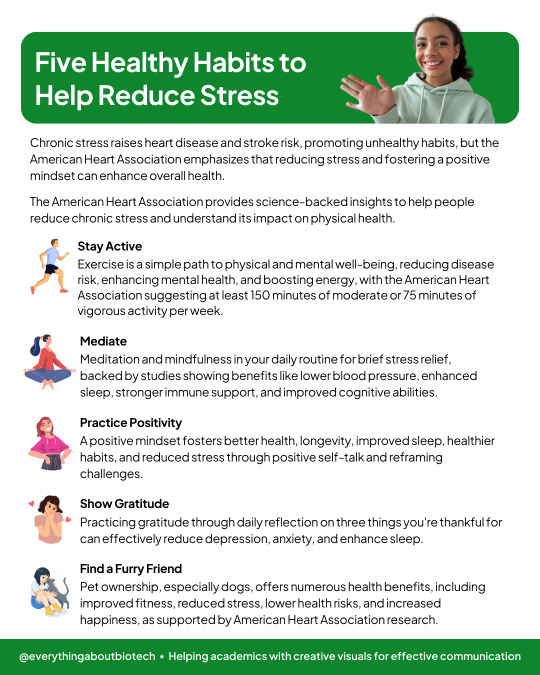
5 Healthy Habits to Help Reduce Stress 🤗
Chronic stress raises heart disease and stroke risk, promoting unhealthy habits, but the American Heart Association emphasizes that reducing stress and fostering a positive mindset can enhance overall health.
The American Heart Association provides science-backed insights to help people reduce chronic stress and understand its impact on physical health.
Stay Active
Exercise is a simple path to physical and mental well-being, reducing disease risk, enhancing mental health, and boosting energy, with the American Heart Association suggesting at least 150 minutes of moderate or 75 minutes of vigorous activity per week.
Mediate
Meditation and mindfulness in your daily routine for brief stress relief, backed by studies showing benefits like lower blood pressure, enhanced sleep, stronger immune support, and improved cognitive abilities.
Practice Positivity
A positive mindset fosters better health, longevity, improved sleep, healthier habits, and reduced stress through positive self-talk and reframing challenges.
Show Gratitude
Practicing gratitude through daily reflection on three things you're thankful for can effectively reduce depression, anxiety, and enhance sleep.
Find a Furry Friend
Pet ownership, especially dogs, offers numerous health benefits, including improved fitness, reduced stress, lower health risks, and increased happiness, as supported by American Heart Association research.
#MentalHealth#MentalHealthMatters#EndTheStigma#Wellness#SelfCare#Mindfulness#Anxiety#Depression#MentalHealthAwareness#YouAreNotAlone#MentalHealthSupport#SelfLove#PositiveMentalHealth#Therapy#CopingStrategies
12 notes
·
View notes
Text
Nurturing Mental Well-being: Dr. Smith's Comprehensive Guide to a Healthier Mind
Introduction:
In the labyrinth of life, our mental well-being stands as a beacon guiding us through the twists and turns, the highs and lows. As a physician deeply committed to the holistic health of my patients, I have traversed the realms of mental health, studying, understanding, and prescribing strategies to nurture the mind's resilience. In this comprehensive guide, we embark on a journey together, exploring the myriad facets of mental well-being and discovering the practices that nourish our inner selves.
Chapter 1: Understanding Mental Health
Before we embark on our journey towards better mental health, it's crucial to lay a foundation of understanding. What exactly is mental health, and why does it matter?
Mental health encompasses our emotional, psychological, and social well-being, influencing how we think, feel, and act. It affects how we handle stress, relate to others, and make choices. Good mental health isn't just the absence of mental illness; it's about thriving in life, experiencing joy, fulfilment, and resilience in the face of adversity.
Throughout history, mental health has been stigmatized and misunderstood. However, in recent years, there has been a shift towards destigmatizing mental illness and promoting mental well-being as a vital aspect of overall health.
Chapter 2: The Mind-Body Connection
The mind-body connection lies at the heart of mental well-being. Our thoughts, emotions, and behaviours are intricately linked to our physical health, influencing each other in a complex dance of interconnectedness.
Research has shown that lifestyle factors such as diet, exercise, sleep, and stress management play a significant role in mental health. When we neglect our physical health, our mental health suffers, and vice versa. Therefore, it's essential to adopt a holistic approach that nurtures both mind and body.
Chapter 3: The Pillars of Mental Well-being
Building upon the foundation of understanding and the mind-body connection, we delve into the pillars of mental well-being. These pillars represent the fundamental aspects of life that contribute to our overall mental health.
Self-Care: At the core of mental well-being lies self-care—the practice of nurturing and nourishing ourselves physically, emotionally, and spiritually. Self-care encompasses a wide range of activities, from taking time for relaxation and leisure to setting boundaries and prioritizing our needs.
Social Connections: Human beings are inherently social creatures, wired for connection and belonging. Strong social connections provide a sense of support, companionship, and security, buffering us against stress and adversity.
Emotional Regulation: Emotions are a natural and essential part of the human experience, but managing them effectively can be challenging. Emotional regulation involves understanding, expressing, and coping with our emotions in healthy and adaptive ways.
Meaning and Purpose: A sense of meaning and purpose gives our lives direction and significance, fueling our motivation and resilience. Cultivating meaning and purpose involves reflecting on our values, goals, and passions and aligning our actions with what matters most to us.
Coping Skills: Life is full of challenges and setbacks, and how we cope with them can profoundly impact our mental health. Developing effective coping skills, such as problem-solving, resilience, and optimism, equips us to navigate life's ups and downs with grace and resilience.
Chapter 4: Practical Strategies for Mental Well-being
Armed with an understanding of the pillars of mental well-being, we turn our attention to practical strategies that promote mental health in everyday life. These strategies encompass a range of lifestyle changes and habits that support our overall well-being.
Prioritize Self-Care: Make self-care a non-negotiable part of your daily routine. Schedule regular time for activities that bring you joy, relaxation, and rejuvenation, whether it's reading a book, taking a long bath, or practising mindfulness.
Cultivate Healthy Relationships: Invest time and energy in nurturing meaningful connections with friends, family, and loved ones. Foster open communication, trust, and mutual support, and surround yourself with people who uplift and inspire you.
Practice Mindfulness and Meditation: Incorporate mindfulness practices such as meditation, deep breathing, and body scans into your daily routine. These practices help cultivate present-moment awareness, reduce stress, and enhance overall well-being.
Engage in Physical Activity: Regular exercise is not only beneficial for your physical health but also for your mental well-being. Aim for at least 30 minutes of moderate exercise most days of the week, whether it's walking, jogging, cycling, or dancing.
Eat a Balanced Diet: Fuel your body and mind with nutritious foods that provide essential nutrients and energy. Aim for a balanced diet rich in fruits, vegetables, whole grains, lean proteins, and healthy fats, and limit your intake of processed foods, sugar, and caffeine.
Prioritize Sleep: Quality sleep is essential for mental health and overall well-being. Aim for 7-9 hours of uninterrupted sleep each night, and establish a relaxing bedtime routine to signal to your body that it's time to wind down.
Set Realistic Goals: Set achievable goals for yourself, both short-term and long-term, and break them down into manageable steps. Celebrate your progress along the way, and adjust your goals as needed to stay aligned with your values and priorities.
Seek Support When Needed: Don't hesitate to reach out for help if you're struggling with your mental health. Whether it's talking to a trusted friend or family member, seeking therapy or counselling, or consulting with a mental health professional, support is available and effective.
Chapter 5: Overcoming Challenges and Barriers
Despite our best efforts, we may encounter challenges and barriers on our journey towards better mental health. These challenges may include stigma, lack of resources, or personal obstacles that hinder our progress. However, with resilience, determination, and support, we can overcome these challenges and continue moving forward on our path to well-being.
Chapter 6: Cultivating Resilience
Resilience is the ability to bounce back from adversity, to adapt and thrive in the face of challenges. Cultivating resilience is essential for maintaining good mental health and navigating life's ups and downs with grace and fortitude. Strategies for building resilience include:
Developing a growth mindset
Building social support networks
Practising self-compassion
Seeking meaning and purpose
Cultivating optimism and gratitude
Chapter 7: Conclusion and Reflections
As we reach the conclusion of our journey, take a moment to reflect on what you've learned and how you can apply it to your life. Remember that mental health is a lifelong journey, and it's okay to seek support and guidance along the way. By nurturing your mind, body, and soul, you can cultivate resilience, happiness, and fulfilment in every aspect of your life.
#MentalHealth#WellnessTips#MentalWellbeing#Mindfulness#HealthyMind#SelfCare#EmotionalWellness#StressManagement#PositiveMindset#MentalWellness#MentalHealthAwareness#Therapy#SelfImprovement#MentalHealthSupport#CopingStrategies
4 notes
·
View notes
Text

Freedom forever 🇺🇸
#HealingJourney#EmotionalWellbeing#PhysicalWellbeing#StressRelief#AnxietyRelief#RelaxationTherapy#Aromatherapy#SoothingMusic#PersonalizedCare#HolisticHealing#PeacefulMind#BodyMindSoul#HealingTouch#WellnessTherapist#MentalHealthSupport#CalmMind#TraumaRecovery#SelfCareRoutine#InnerPeace#HealingVibes#TherapeuticTouch#HealthAndWellness#HealingEnergy#Mindfulness#BalanceAndHarmony#HolisticWellness#EmotionalHealing#WellnessJourney#WellBeing#FindYourCalm
4 notes
·
View notes
Text
Counseling can be a highly effective and beneficial treatment for individuals struggling with depression.
Here are some of the key benefits of counseling for depression:
Emotional Support: Counseling provides a safe and supportive environment where individuals can express their feelings and thoughts without judgment. This can help people with depression feel heard and understood, reducing feelings of isolation.
Identifying Triggers: A counselor can help individuals identify the underlying causes and triggers of their depression. By understanding these factors, individuals can work on addressing them and developing coping strategies.
Learning Coping Skills: Counseling equips individuals with practical coping skills and strategies to manage their depression. These skills may include stress reduction techniques, problem-solving strategies, and emotion regulation techniques.
Setting Realistic Goals: A counselor can assist in setting achievable goals and creating a structured plan for overcoming depression. This can help individuals regain a sense of purpose and motivation.
Improved Self-Esteem: Depression often leads to negative self-perception. Counseling can help individuals challenge and reframe negative self-talk, leading to improved self-esteem and self-worth.
Medication Management: For individuals prescribed medication for depression, counseling can complement pharmacological treatment by ensuring proper medication management and monitoring for side effects.
Enhanced Communication: Depression can strain relationships. Counseling can improve communication skills, helping individuals express their needs and feelings to loved ones more effectively.
Preventing Relapse: Counseling can teach individuals how to recognize early warning signs of depression relapse and develop strategies to prevent it from recurring.
Healthy Lifestyle Changes: Counselors often address lifestyle factors such as diet, exercise, and sleep, which can significantly impact mood. They can help individuals make positive changes in these areas.
Increased Self-Awareness: Counseling encourages self-reflection and self-awareness, helping individuals gain a deeper understanding of themselves and their depression.
Safe Space for Grief and Loss: If depression is related to grief or loss, counseling can provide a safe space to process these emotions and work through the associated challenges.
Long-Term Well-Being: Counseling can provide tools and insights that promote long-term mental health and resilience, helping individuals not only manage depression but also thrive in the future.
It’s important to note that the benefits of counseling may vary from person to person, and the effectiveness of counseling can depend on the individual’s willingness to engage in the process. Additionally, in some cases, a combination of counseling and medication may be the most effective approach to treating depression. If you or someone you know is struggling with depression, seeking help from a qualified mental health professional is a crucial step towards recovery.
#DepressionCounseling#MentalHealthMatters#TherapyForDepression#CounselingSupport#HealingJourney#TalkTherapy#EmotionalWellness#CopingStrategies#MentalHealthAwareness#DepressionHelp#SelfCareJourney#MindfulnessForHealing#EndTheStigma#MentalHealthSupport#PositiveMentalHealth#YouAreNotAlone#MentalHealthRecovery#MentalHealthAdvocate#WellnessJourney#HopeForHealing
2 notes
·
View notes
Text
october 15, 2023
I haven’t written in a few weeks, I think it’s because I’m afraid of what will come up if I open myself up to it. I’ve been good about consistently posting up until now. Part of my pause was purely ego, I didn’t know if something was worth writing if I wasn’t posting it. I didn’t write, I’ve been afraid to admit that I don’t think I’ve been taking as good of care of myself as I know I could be. I don’t say this in judgment, I say it in observation of myself- I know I could be doing better. I’ve been wondering what the point is.
I track my moods every day, on a scale of negative two to positive two. Negative two: “I really do not want to exist right now.” Positive two: “Nothing can fucking stand in my way.” I journal about the feelings associated with each number I give myself, lately my journal has been full of negative-one reflections. I was hoping that when I started this blog, it would reflect my progress. I was equating meditation with progression. This was intended to be a reflection of how well I was doing, instead it is a reflection of how hard this is. I wish I had positive news to share, it’s discouraging to share that this is a LOT harder than I thought it would be.
If anything, I owe myself honesty and consistency. I owe it to myself to admit that med-management isn’t perfect and being bipolar is fucking hard. I just need to say it; this is hard. I feel like there was a part of me that thought that taking meds would cure it, take away the negative-one days altogether, but after a few weeks of depression, isolation, and reflection, I don’t think that’s the point at all.
I think the point is to be aware of the days and to acknowledge that they will pass. The point is that I am eventually going to feel my feelings whether I like it or not, so I might as well write. I think the point is awareness.
I am thankful for this awareness, it will guide me to my next day. No matter where my mood falls on the scale, I can handle it, I can write about it, I can share it. That is the whole point.
2 notes
·
View notes
Text
Mental Health plays a vital role in determining how other aspects of our lives turn out, which is why it’s important to be aware of the several ways your mental state can reflect in your life.💛
Swipe 👉 to see the ways your Mental Health can impact your life.
Please like 👍 share this post to help someone who is struggling today.
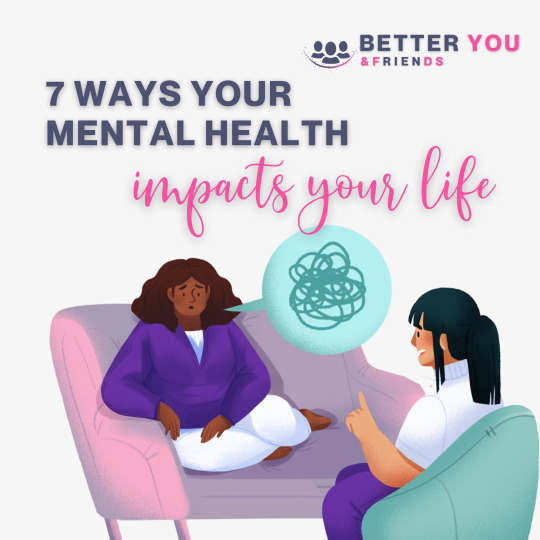
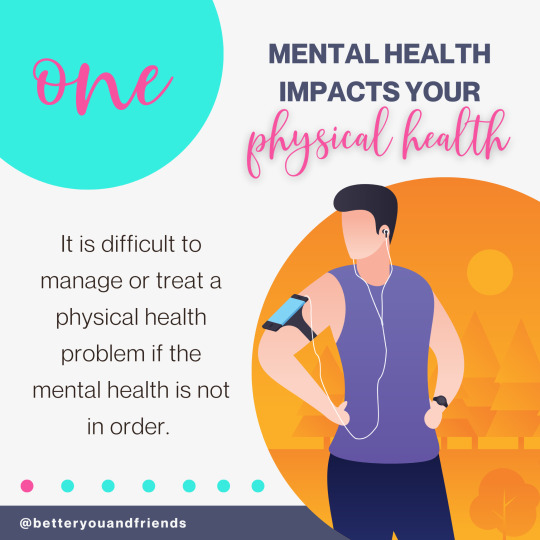


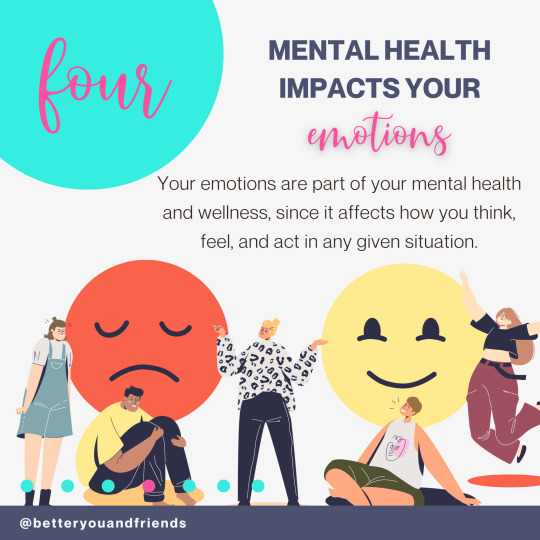
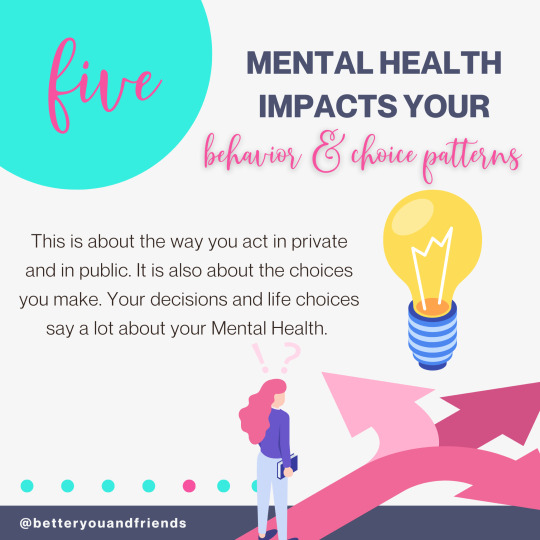



#mentalhealthsupport#mentalhealth#mentalhealthawareness#mentalwellness#mentalwellbeing#betteryouandfriends#mentalhealthcare
13 notes
·
View notes
Text

#depression#mentalhealth#anxiety#sadness#hopelessness#isolation#loneliness#fatigue#loss#grief#mentalhealthawareness#mentalhealthsupport#endthestigma#youarenotalone
28 notes
·
View notes
Text
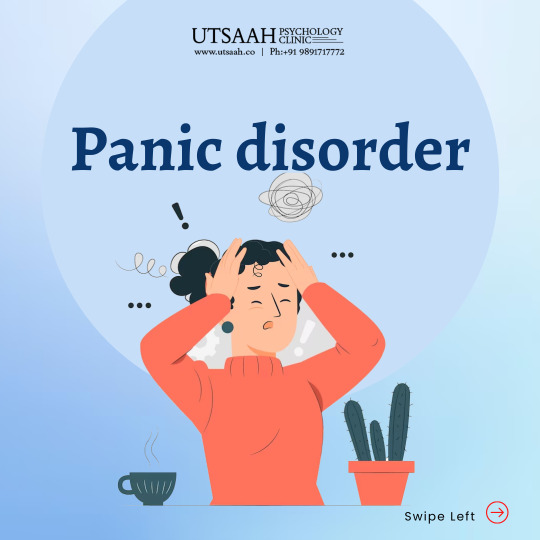

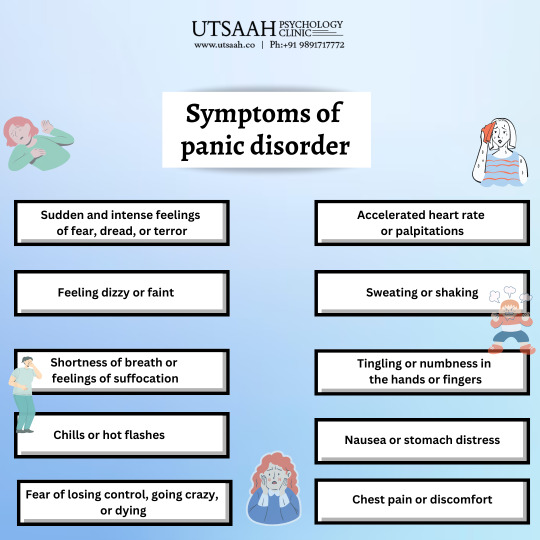

Panic disorder is an anxiety disorder where you regularly have sudden attacks of panic or fear. Everyone experiences feelings of anxiety and panic at certain times. It's a natural response to stressful or dangerous situations.
Check out the post to learn more about panic disorder........
If you faced this type of situation in your life so, Book your appointment for psychological counseling now!!!!!!!!!!!!!!!!!!!
call us:- 9891717772
visit our website: www.utsaah.co
#panicattack#panicdisorder#panicdisorderrecovery#panicdisorderawareness#anxity#depress#mentalhealthawareness#mentalhelthawareness#mentalhealthsupport#relexing#feel#feelgood#boosting#innersatisfaction#innerimprovement#support#anxietyrelief#depressionrelief#recovery#psychology#psychologist#psy#arvindotta#utsaahpsychologyclinic
5 notes
·
View notes
Photo

By Top Girl Studio.
Follow me on Insta for more content!
https://www.instagram.com/topgirl.studio/
#graphicdesigner#graphicdesign#design#print#posterdesign#poster#mentalhealthsupport#selflovequotes#selfcarematters#motivationalquotes#positive quotes#mindsetiseverything#positive vibes#vibes#pastel aesthetic#cute quotes#topgirlstudio#bossbabequotes
11 notes
·
View notes
Text
Ibu
Aku memegang pundak ibuku hari itu. Rohku yang sudah memasuki fisik orang dewasa telah membuat rasa pegangan tanganku berbeda dari sebelumnya, ketika kecil.
Dulu, ketika kecil, aku ingat sekali bahwa lengan ibuku begitu besar. Bahkan dulu aku harus mengeluarkan seluruh tenagaku untuk memijit lengan ibuku yang sedang lelah karena pekerjaan sekolah yang sangat seabreg.
“Kurang keras Nangg” Protes ibuku karena pijitanku kurang terasa baginya.
Aku yang mendengar instruksi itu langsung mengerahkan segala otot-otot kecil usia 8 tahunan untuk mengerahkan tenagaku. Akhirnya, momen pijat tangan ibu lebih mirip kepada meremas lengannya ketika itu.
Hari ini, segalanya telah berubah. Lengan ibu yang dahulu besar sekali, kini terasa kecil. Berat badan ibuku turun karena dimakan usia, sedangkan fisikku terus menguat karena bertambah dewasa.
Walaupun menjadi tua adalah keniscayaan, tapi jika aku bisa meminta, aku akan memohon kepada semesta untuk tidak menuakan ibuku. Aku ingin bisa seumuran dengan dia, menjadi orang yang fisiknya semakin menguat bersama, kemudian menua bersamanya. Aku ingin seusia dengannya, agar aku bisa memahami bagaimana menjadi dia di waktu yang sama. Kami sering berbeda pendapat, dan aku menduga hal ini karena kami hidup di waktu yang berbeda. Maka, jika aku bisa seumuran dengannya, mungkin akan lebih banyak hal yang sama daripada hal yang berbeda.
Selain itu, aku juga takut kehilangan dia.
Bukan apa-apa, aku hanya tak yakin apakah aku bisa hidup tanpanya. Dunia tanpa dia sepertinya akan gelap dan berat. Doa-doanya tak akan menemaniku lagi. Support verbalnya tak akan lagi aku dengar. Kemudian, bagaimana aku bisa hidup?
Aku baru tersadar bahwa teman-temanku yg sudah kehilangan orangtua adalah manusia-manusia kuat yang perlu dikuatkan. Kok bisa ya mereka masih semangat ketika oratuanya telah tiada? Apakah ibunya telah menetap dihatinya? Atau karena memang karena mereka kuat sehingga diberi ujian yg berat?
Jika memang begitu cara semesta bekerja, aku lebih memilih menjadi orang yg lemah. Aku tak ingin kehilangan ibuku.
Aku bisa hidup tanpa saudara, tanpa teman, bahkan tanpa sahabat. Tapi aku tak yakin apakah aku bisa hidup tanpa ibuku.
Semoga kamu sehat selalu, Ibu.
#mentalhealthawareness#mentalhealthmatters#selfcare#mentalhealthrecovery#mentalhealthsupport#mentalhealthawarenessmonth#anxietyawareness#depressionawareness#mentalhealthstigma#mentalhealthadvocate#selfreminder#selfhealing#selfdevelopment#selfimprovement#movementislife#fyp#foryou#reelsindonesia#reelsselfcare#smallaction#toxicpeople#selflove
5 notes
·
View notes
Photo

Let’s talk because no one talks about how hard it is to be alive after an attempt at unaliving. Let’s talk because no one talks about the grief that comes along with setting boundaries and taking care of yourself first. Let’s talk because no one talks about how one minute everything you know can change in the best way and the worst way simultaneously. Let’s talk because no one talks about how hard it is to be okay sometimes. But in the same breath - let’s talk because the very good days are the days you are the most grateful to be alive. Let’s talk because medication CAN work and it CAN greatly improve your quality of life if you find the right dose&medication that works for YOU. And let’s talk because MENTAL 👏🏻 HEALTH 👏🏻 MATTERS 👏🏻 #BellLetsTalk 💙 @bell_letstalk #mentalhealth #mentalhealthawareness #mentalhealthmatters #mentalhealthrecovery #mentalhealthsupport #mentalhealthadvocate #itsoknottobeok (at Toronto, Ontario) https://www.instagram.com/p/Cn3OPtYLbqA/?igshid=NGJjMDIxMWI=
#bellletstalk#mentalhealth#mentalhealthawareness#mentalhealthmatters#mentalhealthrecovery#mentalhealthsupport#mentalhealthadvocate#itsoknottobeok
2 notes
·
View notes
Text

Tip 3 - Help yourself by helping others
#christmas2022#Christmas#christmastime#mentalhealth#mentalhealthmatters#MentalHealthAwareness#lonely#loneliness#depressionhelp#depressionawareness#holidayseason#Holidays#family#relationships#healthyrelationships#advice#holidayblues#mentalhealthsupport
2 notes
·
View notes